|
|
|
|
|
|
|
MEMBER PROFILES |
|
|
|
|
|
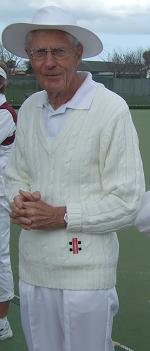 BERT FALLOWFIELD BERT FALLOWFIELD
Gladys and I met in 1956 – in Hamilton New Zealand – we were both
Leaders in the Scout movement. Aged in our mid twenties our respective
friends had given up on either of us marrying. Despite our vastly
different upbringings we clicked immediately and were married just ten
months later – I hasten to add our first child arrived a further ten
months later.
Gladys grew up on a backblocks farming property in northern New South
Wales. Her father was a tenant farmer struggling to make a living on
pretty rough virgin country that he was trying to bring into
production. They had no close neighbours or family, no electricity,
running water or telephone and were miles from the nearest town over
rough roads.
Gladys was the eldest and she had three brothers to boss around. For
the first few years they were home taught. They made their own fun, as
kids always do but the whole family were expected to help with farm
chores from an early age. Gladys at age five had her first horse and
by nine or ten was pretty conversant with farm work. She could also
handle a rifle. This all made her a very practical, down to earth, get
on with the job sort of person.
Holidays were sparse but consisted of going to the beach camping rough
for a few days and sleeping on sacks stuffed with dry seaweed.
Attending the district school Gladys did well and eventually became
Head Girl. She went on to work in the bank, did a bit of travelling,
played tennis, surfed and watched all her friends get married.
In 1956 she decided to go to Canada for year or so but her mother
persuaded her to try New Zealand first in case she got homesick. She
never got any further than New Zealand although many years later we
did go to Canada with her parents.
Meanwhile I was born in Ham near Richmond, Surrey, England, a very
late addition to the family, my parents both being close to forty. I
had two older sisters aged 11 and 15 when I arrived and by the time I
was five they had left home and gone into service in the big houses
that are scattered through Southern England. My father was supervisor
of building maintenance of Government properties – a regular job with
steady income.
Ham is a lovely place close to London, very picturesque, big old
houses around the common, the Thames close by, along with the
Petersham Meadows, Richmond Park and not far away Kew Gardens and
Hampton Court all well established for 100s of years. We had lots of
family close by whom we frequently visited. Father was busy at work
and mother mostly looked after me. Our home was nicely furnished and
in a good neighbourhood.
I went to the local primary school just down the road. In my spare
time I read a lot of children's books. At age seven I was given a brand
new child's bike, but it was subsequently confiscated after I was found
many many miles away from home cycling along main roads out in the
country on my way to see my cousin who lived in Farnborough. At
Christmas I received lots of presents and was taken to the pantomime
in Kingston and all in all totally spoilt.
For holidays mother and I went to Bournemouth and stayed at a guest
house. In 1938 both my sisters got married but thereafter had very
different lives – the elder had five children, a sickly husband and
lived in poverty for the rest of her life. The younger one had a
hardworking husband who had his own business and provided her and her
children a good living. He became involved in politics and she met
many interesting people including the prime minister and other members
of parliament. Both marriages lasted full term. My parents on the
other hand divorced in 1942 and I was sent off to live with the elder
sister despite her somewhat straitened circumstances – my father paid
for my keep which possibly helped my sisters finances but she still
had to scrimp and scrape to feed the family.
Interestingly
Gordon Netley (who was also born in 1930) and I went to school and
worked in the same town (Chichester) for 10 years from 1940 – we very
likely passed in the street but never met. His war experience and mine
were very similar – it was an interesting bit of excitement on the
side – we watched dog fights in the sky – got to recognise makes of
aircraft (theirs and ours) – collected war souvenirs – and probably
learnt involuntarily a bit of geography by sticking pins in maps. We
never came face to face with the deaths, maiming, destruction and the
total horror of war. We had blackouts, rationing, shortages and the
occasional air raid siren but these were things you just accepted and
then got on with your life.
My father enrolled me in a private school where my subjects included
Latin, French, German, English Literature etc. I was only average at
school although good at maths.
I became very involved with Scouts and stayed in the movement for
twenty years.
Aged 17 I left school and joined the civil service as a clerk in
Chichester County Court office – very boring work and in 1951 I had
the opportunity to emigrate to New Zealand to a job with the NZ Public
Service – this was my chance to get away from my sister and her family
and I took it with my fathers blessing – I think he was well aware of
my sisters circumstances.
In New Zealand I completed my two year contract with the Justice
Department and in 1953, realising I needed qualifications if I wanted
to get ahead, I signed up for a three year correspondence course for
the Professional Accountancy Examinations passing which enabled you to
be admitted to the Accountants Society as a Registered (now Chartered)
Accountant. It took me four years but opened the way to progress to
good positions. I reached Head Office Accountant with Wright
Stephensons Motor Division but that meant moving to Wellington which
neither of us enjoyed so I took a position with Robert Holt and Sons
becoming Company Secretary, and after the merger with Carters held a
senior financial position in the merged group – at all times very
challenging and interesting work
Gladys and I got married in 1957 and we had three daughters.
From then on it was a normal married existence for us – kids,
illnesses, serving on school committees and the like. We moved to Hawkes Bay fairly early in our marriage (1961) and have been here ever
since except for a year in Wellington and two years in Auckland. We
have become very involved in the community and served on committees in
various organisations – sports, art, education, gardening etc etc.
Gladys played tennis whilst I played cricket, then we both moved on to
golf which we have played for the past 40 years. I was finding golf
just a bit hard (the fairways seem to have got longer, the greens and
the holes smaller and the bunkers and trees just huge). So in August
2011 at age 80 I switched to bowls which I am finding interesting,
challenging and the club members very welcoming and helpful. |
| |
|
Born in
Chichester Sussex 1930 and spent my early childhood growing up in that
lovely City.
During 1940-45, well remember as a 10 year old the excitement of the
battle of Britain, not old enough to realise just how serious it all was
and young enough to think it was a big game. Chichester itself was only
bombed on two occasions. But, in the surrounding district there was the
R.A.F Tang mere aerodrome and a number of satellite airfields where
Squadrons of fighters were stationed. Always plenty of things to see and
off on our bikes if we heard of any crashed aeroplanes, especially if they
were German. We also once watched a Doodle Bug fly over being chased by
Spitfires it sounded to us kids just like a motor cycle without exhausts,
not sure if the Spitfire caught it or not.
I started
an apprenticeship with local Ford dealer D Rowe and Co. in 1945. Working
in the Agriculture machinery workshops where most of the staff were woman,
later I was out in the field repairing Tractors and machinery.
Our firm
had a very active sports and social club so played a lot of Soccer,
Tennis, and Badminton. I also developed a love of Golf which I played
until 2007. Also took up Ballroom Dancing which is where I met my future
wife Jan .
Two years
in the Army on National service with the R.E.M.E. and a further three
years in Territorial Army as an instructor in Gun fitting and Motor
vehicle repairs.
Married
Jan in 1954 and over the next six years was blessed with the birth of
three lovely daughters, Vickie the eldest and Gaye and Debbie the twins.
After
much thought we decided to immigrate to New Zealand and was offered a
number of jobs over here. We were then on the Ten pound immigration
scheme, which meant a long voyage by sea, but the Deluxe Ford in Wairoa
offered to fly us out which seemed very attractive, also we had friends
who had immigrated to Hastings a few months before so I accepted their
offer.
Arriving
at the Wairoa Train station on Queens Birthday weekend 1965 and being put
in the Ferry Hotel was a bit of a culture shock but it did not take us
long to settle down. Although, we had to shift houses five time in the
first year.
With luck
I made an offer on two acres of land on the riverbank in Mitchell Rd. It
had been standing empty for a number of years. As it was Maori land the
locals were reluctant to attempt its purchase due to it having so many
owners to deal with. I as a new lad was unaware of this and made
enquires, and as it turned out, it was owned by just one Maori lady, from
who we purchased it.
Our house
was built on the Riverbank and we moved in Easter 1967 and spent the next
few years fencing, putting in driveways and growing potatoes. The girls
had a number of pets, Bobbie calves, lambs, and at one time Goldie the
horse.
At the
end of 1970 while on Holiday Camping with friends at Mahia, Jan was taken
ill and was flown to the Wairoa Hospital where she died on New Years Day
of 1971.
Despite
the great loss to us all, I have always said that if this had happened
anywhere in the world away from my family, I could not have chosen a
better place than Wairoa, being a small town every body seem to know and
the sympathy and kindness shown to us will always be a special memory, the
people of Wairoa will always have a special place in my heart.
After
five years on our own I met and married Lyn and adopted two more children
Sue and John. We undertook to modify our house and after 10 years we had a
beautiful home and gardens. I had also taken up a position as a teacher
of Engineering at Wairoa College. During these years I developed our land
into a subdivision of seven building sections. Now called Rimu Drive.
During a
trip to Auckland we where involved in a serious car accident and I had leg
and facial injuries and Lyn a broken shoulder. Luckily the children were
not with us. I finally got back to the college after a year off work, but
the accident had put enormous strains on our marriage and Lyn was very
keen to move to Auckland, so the house was sold and we bought a home in
the North shore and I started to teach at Mount Albert Grammar School.
After a couple of years I realised that Auckland had all the overcrowding
problems that I had left England to get away from.
Lyn and I
finally separated and I returned to Napier and took up a position at
Wycliff Intermediate School and was there until I retired in 1995. I now
enjoy my sports, my garden, reading and writing. Sue and John remain part
of the family and Lyn and I still good friends.
|
|
|
| |
DENIS STANDRING - MY LIFE IN
WAIROA
I was born in 1941, and lived the majority of my adult life there.
Back then, Wairoa was a real cool place to live. Certainly, we
didn’t have the amenities of Napier and Hastings, not to mention
Auckland or Wellington, and as a result, made our own
entertainment.
As young children, there were seven to ten of us likely lads
living in the same street and we all formed friendships, which
last till this day. One of our favourite activities, mainly in the
summer, was using the riverbank. Back then, the bank was covered
in a lot more bush like trees than there are today and as a
result, many, many fine games of cowboys and Indians, cops and
robbers, took place. We all learnt to swim in the Wairoa River,
which over the years has claimed many lives, but fortunately none
of our gang. We started off by doing Dog Paddle in the shallows,
always so one foot touched the mud, and as we grew more confident,
we would swim just outside the shallow. Before long, we were,
believe it or not, and quite unbeknown to our parents, swimming
right across the river, and back again. I might add that the river
is approx 20 feet deep in the middle, and a couple of hundred
yards across, so it was no mean feat for a gang of dog paddling
boys. From memory, no-one ever got into difficulties, most of the
time, we didn’t even wear togs and many a fine sight was seen as
we learnt to duck dive. How lucky we were, with our casual
upbringing and freedom which gave us a form of independence as
compared with children the same age today who are supervised and
governed and watched over and coddled every step of the way.
We were surrounded in those days by a lot of empty paddocks, and
my father built a set of goal posts made out of Manuka. I can
still see them to this day, with a very obvious lean the way of
the prevailing wind. Many hours were spent trying to become
legendary all blacks. Unfortunately not one of us made that great
final step.
Another highlight of summer was that near neighbours sported a
grass tennis court surrounded by a Macrocarpa hedge. Unknown to us
kids at the time, the players would be all inebriated, some more
than others and we used to take great joy in sitting all around
the top of the thick Macrocarpa hedge, retrieving tennis balls,
quite often a player would reward you with a sixpence and once I
remember, getting a shilling.
I attended St.Joseph’s Convent school and then Wairoa College, and
whilst I did not distinguish myself academically, I did show some
competency in the sporting arena. I left school and went to work
at the local freezing works as an office cadet, and then a couple
of years later, departed for Christchurch to train to be a Meat
Inspector. Passed my exams a couple of years later (much to my
amazement) and after spending five years in Christchurch,
transferred back to the Wairoa works. It soon became obvious that
if I was to achieve any great status within the Meat Inspector
ranks, I would have to keep transferring and at that stage
couldn’t be bothered. Next step was a Dairy which I ran
successfully (mind you there were no supermarkets and garages
never sold grocery items or confectionery items) for five years,
then was presented with the opportunity to buy the local Sports
Shop which I operated as Standring Sports for the next 17 years.
Sold out, did several miscellaneous jobs then left Wairoa to start
Motelling. Some ten years later I retired to Napier.
Sadly, Wairoa is no longer the idyllic playground I grew up in,
and like many other small, rural settlements throughout NZ,
appears to have gone backwards. However, I still have my good
memories which will forever remain in my heart. |
|
|
| |
| |
|
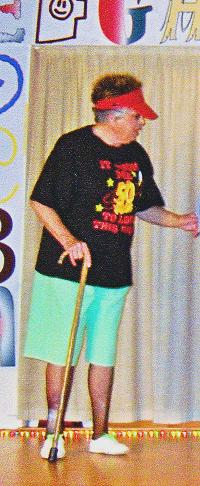 |
JEAN SPEAKMAN (Jan 2011)
I was born in Napier and brought up in Lee Road, Taradale. My Primary
education was at Taradale Primary School and then on to Napier Girls’ High
School. I left school after my Fifth Form year and worked as a Clerk at
the Land and Deeds Office (Land Registry Office) for two years while
waiting to do my Nursing training.
In January 1957 I went to Cook Hospital in Gisborne to start my training
and sat and passed my finals in Dec. 1959.
In February 1960 John and I were married in St John's Cathedral Napier. We
lived in Gisborne for twenty years coming back to Napier in 1977. We have
3 grown up (?) sons, 3 lovely daughters-in-law and 8 grandchildren, (7
boys and 1 girl) and a great granddaughter. I continued my career after
marriage and while bringing up our family.
All my life I have been involved in church activities and choirs. My
hobbies are singing, leisure marching, spinning, knitting and reading.
When we first came back to Napier we played Indoor Bowls for about 25
years and then changed to Lawn Bowls and find that very rewarding and
frustrating!! and also enjoyable (most of the time). It is a “thinking”
game and keeps one’s mind active. |
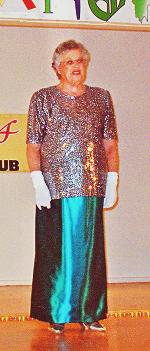 |
|
|
I still sing and perform on stage with Tiffanys Variety Club and we also
entertain at Rest Homes and anywhere else we are asked to. |
| |
JOHN McLAUGHLIN (Nov 2010)
I was born in Greymouth,
the third eldest of five boys and three girls. Dad was an engine driver
for NZ Railways, he trained and raced dogs and was a part-time bookie ...
what a great introduction to real living. I completed my first two years
schooling with the Sisters of Mercy then went to the Marist Brothers for the rest of my primary years. My secondary education took place
at a boarding school in Tuakau, South Auckland.
In 1955-56 I
moved to South Canterbury and trained for two years to become a Marist Brother. Training was
very strict and not everyone who started the course completed it. Some left of their own accord
and some were told to leave. We rose each morning at 5.30 and our time was
taken up with prayer, study and work. Breakfast and lunch were eaten in
total silence
and we were not allowed to speak to each other until mid-afternoon.
At 3 pm
we
played a game (soccer, softball) then it was more study.
There were no phones, no newspapers or magazines and no radios ...
although once we stole a radio from the milking shed to listen to the
Springboks play the All Blacks in 1956 ... and got caught! I reckon if
anyone could
survive those two years they could survive anything. Training College in Auckland came next.
After that I
taught in Auckland, Hamilton, Masterton, Lower Hutt and Christchurch.
I
left the Brothers in 1969 from Christchurch and came to Colenso High School where I taught
science for seven years. In those days Colenso had a roll of 1300 so it
was one of NZ's biggest schools. I transferred to Sacred Heart College in
1977 and spent 25 years there before retiring in 2002 ... then I took up bowls.
Colleen and I were married in 1971. She
had been widowed in '69 (Graham died of a heart attack in his early 30's) so I began with a
ready made family of five and later Colleen and I had another five. Our
kids have all done well for themselves, all are usefully employed and five have
university degrees. As far as sport is concerned Michael was selected to play goalie for the NZ roller
hockey team, Carl played volleyball for the North Island, John was a Hawkes Bay 3rd
Grade rugby rep, Chris was athletic champ at St John's College -
the rest did OK. Colleen played basketball for the West Coast
after she left school. I told my kids that I too represented the West Coast
... at rugby. If they pushed me I told them I was an under six stone rep - and
if they really pushed hard I told them I was reserve!!
As you can imagine when all the kids were at home life was
pretty busy. I worked at the TAB
every Saturday for 13 years. Because I enjoyed a beer and a flutter on the horses I built and
sold about 200 dog kennels and after that sold a computerised racehorse
selection system (necessity is the mother of invention). Four of our kids live in Australia, one is in London,
one lives in Wellington and the remaining four are here in Hawkes Bay.
We have 13 grandchildren and early next year the first of them gets married.
Now ... life is so quiet and peaceful!!! |
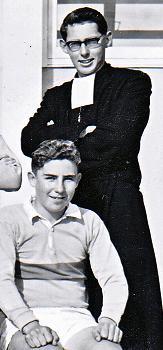 |
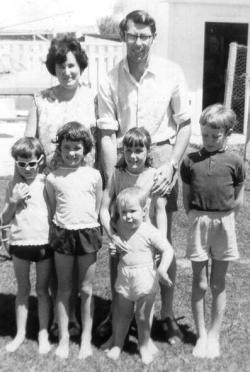 |
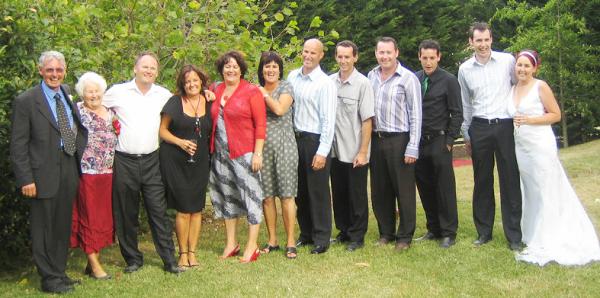 |
| Masterton 1961 - with John Dew
who is now the
Catholic Archbishop of Wellington |
1971 - the year we were married
Ann, Fiona, Maria, Mark
John |
2008 - Sarah's wedding
The family are arranged from oldest to youngest
John, Colleen -
Mark, Maria, Fiona, Ann, John, Michael, Chris, Brent, Carl, Sarah |
|
| |
LAWRIE McLEAN (Nov 2010)
Born Selkirk Oct 1939, never lived there, brought up Melrose by my
grandma, went to Melrose Grammar School, did not learn much grammar.
Melrose is by the river Tweed , the 3 Eildon hills in the background, the
abbey, the birth of sevens rugby was a great place to be brought up. When
someone got married in Melrose, the bride would kick off a rugby ball at
the market cross, which was punted up and down the town and whoever got
away with the ball got to keep it, me and my brother got away with two.
Then moved to Galashiels to my dad when my grandma died. Started training
as a wool sorter, then served my time as a carder and spinner.
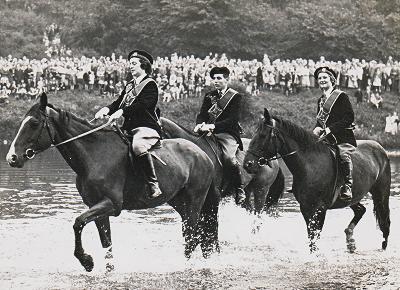 Asked to stand, for Braw
Lad in 1959, was picked as one of
the four attendants, was given about 15 riding lessons. then rode over the
hills to many border historical places, border towns and different
ceremonies with around a hundred supporters on horseback. A small example,
rode across the river Tweed to Sir Walter Scott's house, and received a
whiskey from the butler, then back across the Tweed to Lord Scott's house
and another whisky and so on, nearly drunk in charge of my horse
Mussolini. Asked to stand, for Braw
Lad in 1959, was picked as one of
the four attendants, was given about 15 riding lessons. then rode over the
hills to many border historical places, border towns and different
ceremonies with around a hundred supporters on horseback. A small example,
rode across the river Tweed to Sir Walter Scott's house, and received a
whiskey from the butler, then back across the Tweed to Lord Scott's house
and another whisky and so on, nearly drunk in charge of my horse
Mussolini.
At the time I was a keen badminton player and downed a
few of the Scottish players, took an all-England Junior Champ to 3 sets. I
entered the Border Counties badminton champs senior and junior and I got
through to six finals, winning 4 of them lost the senior gents doubles and
had to default the junior mixed because I knotted up with cramp.
At 20 got a job with a Carpet firm at Durban South
Africa. Flew out on the Comet 4. London, Rome, Khartoum, Nairobi,
Salisbury, Joberg, and finally Durban. I worked days one week and nights
one week. On nights I was the only white person in charge of around a 100
Zulu and the same amount of Indians. The guy who I replaced used to walk
around with a 38 pistol - I had a big torch. At night I used to go to work
by train at Reunion station. I got off the train and crossed the bridge
with about 500 Zulu, who lived in huts near the station. I used to run
with my torch looking for snakes about half a mile to the factory. I am
sure I hold the unofficial world record for that distance.
 When the Zulu half hour break came, they used to bury
themselves in the wool, at the top of these bins which where about 50 feet
high. I used have to climb the ladder of all 4 bins, go in the man hole,
walk across the wool and black arms and legs would appear. I would chase
them back to work. One cold night I went to lay down at my break and
suddenly this black arm shot up, one I had missed, I nearly crapped
myself. Anyway too much to tell. When the Zulu half hour break came, they used to bury
themselves in the wool, at the top of these bins which where about 50 feet
high. I used have to climb the ladder of all 4 bins, go in the man hole,
walk across the wool and black arms and legs would appear. I would chase
them back to work. One cold night I went to lay down at my break and
suddenly this black arm shot up, one I had missed, I nearly crapped
myself. Anyway too much to tell.
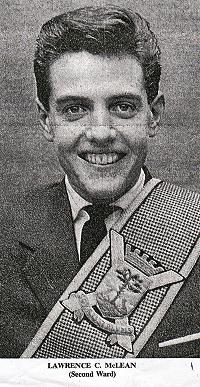 Went back UK by boat.
The Pendenis Castle at Cape town
went up Table mountain and climbed down the front. The boat a week in
front had an explosion killing 9 engineers so we sped up to Las Palmas to
take most of the passengers. Went back UK by boat.
The Pendenis Castle at Cape town
went up Table mountain and climbed down the front. The boat a week in
front had an explosion killing 9 engineers so we sped up to Las Palmas to
take most of the passengers.
A few years later went to Yorkshire to run a mill, met
Valerie and got married in March 1965. We have 3 kids, Paul, Mark and
Samantha, and 8 grandkids. The reason we came to New Zealand started with
the miners strike in 1973 which went on for months. Factories could only
get electricity at allocated times. We would fix machines in freezing
cold, go home in snow, no tea, TV water off, etc. So through the trade I
was offered a 3 year contract as production manager at UEB, got up to
General manager in one takeover, in charge of marketing and production. I
retired as manager for Cavalier, about 7 years ago having survived
numerous takeovers. When heads roll, I learned to duck the sword twice or
it would get you on the way back. Anyway I guess I could write a book on
trouble at the mill. Badminton - member of HB team who won NZ 2nd Division
in 1977, never won by HB since.
All the best, Lawrie |
| |
CRAIG ENNOR (Nov 2010)
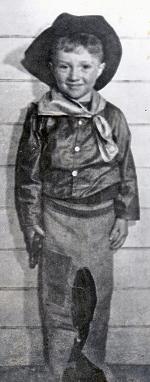 Born (not created) 1941 in Napier. Lived my whole formative years at
Westshore. An amazing place for a young lad to grow up. Spent untold
hours on the beach following my lifelong passion for the sea and the
pursuit of its inhabitants. Supposedly educated at Westshore School,
Napier Intermediate and Napier Boys High. Left school at the end of
1958, theoretically to go and work on a farm for the school holidays,
but "forgot" to go back for my 6th form year. Spent the next few years
as a single shepherd on relatively big properties before getting
married to the "Duchess" in 1964 where I worked as a shepherd on the
Lagoon Farm at Westshore, before taking on a farm manager's position
at the back of Takapau/Norsewood. Spent nearly 10 great years there
before the owner's sons returned home necessitating me to move.
Farming was heading in to a major downturn which, in a nutshell,
forced us, now with two children, to move back to Napier where I
started a new career in the wool scouring trade. This occupation
lasted for 10 years involving a shift to Wellington. We moved to
Hamilton in 1985 to embark on a new venture in the tourism arena,
however this saw me made redundant in 1987 and after several months of
being told I was "too old" to be employable, at the grand old age of
46, I might add, I finally went into the insurance field. This career
move worked very well for me until in 1995 when family circumstances
necessitated a move back to Napier. It had always been our intention
to return "home" to Napier anyway, but was just forced on us about 5
years earlier than planned. Born (not created) 1941 in Napier. Lived my whole formative years at
Westshore. An amazing place for a young lad to grow up. Spent untold
hours on the beach following my lifelong passion for the sea and the
pursuit of its inhabitants. Supposedly educated at Westshore School,
Napier Intermediate and Napier Boys High. Left school at the end of
1958, theoretically to go and work on a farm for the school holidays,
but "forgot" to go back for my 6th form year. Spent the next few years
as a single shepherd on relatively big properties before getting
married to the "Duchess" in 1964 where I worked as a shepherd on the
Lagoon Farm at Westshore, before taking on a farm manager's position
at the back of Takapau/Norsewood. Spent nearly 10 great years there
before the owner's sons returned home necessitating me to move.
Farming was heading in to a major downturn which, in a nutshell,
forced us, now with two children, to move back to Napier where I
started a new career in the wool scouring trade. This occupation
lasted for 10 years involving a shift to Wellington. We moved to
Hamilton in 1985 to embark on a new venture in the tourism arena,
however this saw me made redundant in 1987 and after several months of
being told I was "too old" to be employable, at the grand old age of
46, I might add, I finally went into the insurance field. This career
move worked very well for me until in 1995 when family circumstances
necessitated a move back to Napier. It had always been our intention
to return "home" to Napier anyway, but was just forced on us about 5
years earlier than planned.I officially retired in 2001 and still regard Hawkes Bay as a
wonderful region and am extremely grateful for the friends and
fellowship I still enjoy.
|
|
|
| |
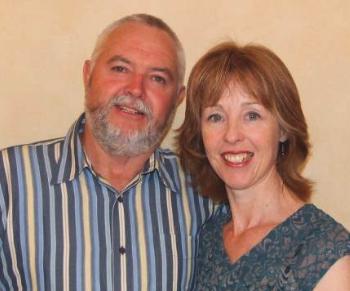 ALAN FRAME (Nov 2010) ALAN FRAME (Nov 2010)
I am a new bowler at the Taradale Club. I joined in February this year
and am thoroughly enjoying this new sport.
I was born in Gisborne attended Mangapapa – Ilminster Intermediate,
and Lytton High Schools and later began my teaching career in Gisborne-
Cobham School 3 yrs after attending Ardmore Teachers College in
1971-3. I have also taught at Patoka -6 yrs, Tawa- 3yrs, and Ruakituri
(inland from Wairoa) – 2.5yrs, and am currently at Bledisloe – 22.5
yrs.
I played soccer for the Thistle club in Gisborne.
Earlier in my life – in the late 70’s-80’s I took up indoor rifle
shooting and fullbore- (.308). My best accomplishment was to shoot for
the North Island team against the South Island and then captain the
rest of NZ against Scotland in .22 (smallbore) indoor shooting. I also
represented Hawkes Bay in both fullbore and smallbore.
I am married to Carolyn - also a teacher, and have 3 children aged 22
Rochelle,20 Jason and 17 Joshua.
I have since semi retired from teaching but still teach reading
Recovery and help with a maths group. |
| |
| |
| |
|